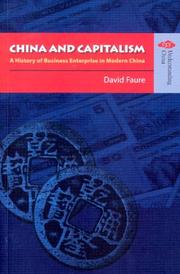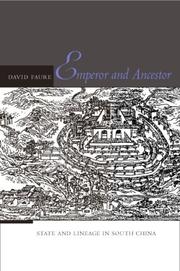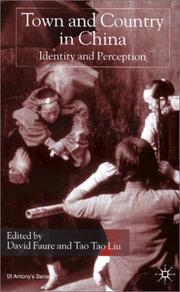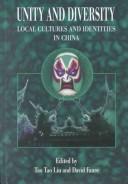| Listing 1 - 10 of 16 | << page >> |
Sort by
|
Book
ISBN: 0195839706 Year: 1986 Publisher: Hong Kong Oxford university
Abstract | Keywords | Export | Availability | Bookmark
 Loading...
Loading...Choose an application
- Reference Manager
- EndNote
- RefWorks (Direct export to RefWorks)
Kinship --- -Villages --- -Hamlets (Villages) --- Village government --- Cities and towns --- Ethnology --- Clans --- Consanguinity --- Families --- Kin recognition --- History --- New Territories (Hong Kong) --- -New Territories (Hong Kong) --- -Genealogy --- Rural conditions --- -History --- Villages --- Hamlets (Villages) --- Genealogy. --- Rural conditions. --- S11/1200 --- S27/0800 --- China: Social sciences--Anthropology, ethnology (incl. human palaeontology): general and China --- Hong Kong--Society in general

ISBN: 9882206697 128270852X 9786612708527 9882203833 9622097839 9622097847 9789882203839 9789882206694 9789622097834 9789622097841 9781282708525 6612708522 Year: 2006 Publisher: Hong Kong : Hong Kong University Press,
Abstract | Keywords | Export | Availability | Bookmark
 Loading...
Loading...Choose an application
- Reference Manager
- EndNote
- RefWorks (Direct export to RefWorks)
This book describes China's encounter with capitalism from the sixteenth century to the twentieth century. It poses poignant questions in simple language, guides the reader through a complex literature and presents a unique point of view.
Capitalism --- Business enterprises --- History. --- China --- Economic conditions --- Business organizations --- Businesses --- Companies --- Enterprises --- Firms --- Organizations, Business --- Business --- S10/0200 --- S10/0220 --- S10/0251 --- S10/1000 --- History --- China: Economics, industry and commerce--General works and economic history: general --- China: Economics, industry and commerce--General works and economic history: 1840 - 1911 --- China: Economics, industry and commerce--General works and economic history: since 1989 --- China: Economics, industry and commerce--Business ethics and philosophy

ISBN: 0804767939 1435608836 9781435608832 0804753180 9780804753180 9780804767934 Year: 2007 Publisher: Stanford, Calif. Stanford University Press
Abstract | Keywords | Export | Availability | Bookmark
 Loading...
Loading...Choose an application
- Reference Manager
- EndNote
- RefWorks (Direct export to RefWorks)
Faure argues that, in China, ritual provided the social glue which law provided in the West. He traces the special lineage institutions for which south China has been noted and argues that they fostered the mechanisms which enabled south China to be absorbed into the imperial Chinese state - first, by introducing rituals that were acceptable to the state, and second, by providing mechanisms which made group ownership of property feasible and hence possible to pool capital for land-reclamation projects important to the state.
Kinship --- Ethnicity --- Inheritance and succession --- Bequests --- Descent and distribution --- Descents --- Hereditary succession --- Intestacy --- Intestate succession --- Law of succession --- Succession, Intestate --- Real property --- Universal succession --- Trusts and trustees --- Ethnology --- Clans --- Consanguinity --- Families --- Kin recognition --- Ethnic identity --- Group identity --- Cultural fusion --- Multiculturalism --- Cultural pluralism --- History. --- Law and legislation --- China --- History --- S06/0204 --- S06/0260 --- S11/0700 --- S12/0216 --- China: Politics and government--Government and political institutions: Ming --- China: Politics and government--The Chinese model --- China: Social sciences--Clan and family: general and before 1949 (incl. names, clan rules) --- China: Philosophy and Classics--Political philosophy

Abstract | Keywords | Export | Availability | Bookmark
 Loading...
Loading...Choose an application
- Reference Manager
- EndNote
- RefWorks (Direct export to RefWorks)
City and town life --- Country life --- Sociology, Urban --- City planning --- Vie urbaine --- Vie rurale --- Sociologie urbaine --- Planification urbaine --- History --- History. --- Histoire --- China --- Chine --- Rural conditions. --- Politics and government. --- Conditions rurales --- Politique et gouvernement --- S11/0450 --- S11/0480 --- -City planning --- -Country life --- -Sociology, Urban --- -Urban sociology --- Cities and towns --- Rural life --- Manners and customs --- Civic planning --- Land use, Urban --- Model cities --- Redevelopment, Urban --- Slum clearance --- Town planning --- Urban design --- Urban development --- Urban planning --- Land use --- Planning --- Art, Municipal --- Civic improvement --- Regional planning --- Urban policy --- Urban renewal --- City life --- Town life --- Urban life --- China: Social sciences--Cities: general and before 1840 --- China: Social sciences--Rural life, rural studies: general and before 1949 --- Government policy --- Management --- Social policy. --- -China: Social sciences--Cities: general and before 1840
Book
Abstract | Keywords | Export | Availability | Bookmark
 Loading...
Loading...Choose an application
- Reference Manager
- EndNote
- RefWorks (Direct export to RefWorks)
Book
Abstract | Keywords | Export | Availability | Bookmark
 Loading...
Loading...Choose an application
- Reference Manager
- EndNote
- RefWorks (Direct export to RefWorks)

ISBN: 9622094023 9789622094024 Year: 1996 Publisher: Hong Kong Hong Kong University Press
Abstract | Keywords | Export | Availability | Bookmark
 Loading...
Loading...Choose an application
- Reference Manager
- EndNote
- RefWorks (Direct export to RefWorks)
"This book examines the evolution of the local identity in China from historical times to the present day. It traces the expression of local identity in religion and myth, in the construction of the provincial character, in the growth of cities, in literature, in economic development and in the expansion of the Chinese state. It argues that the growth of a local identity was part and parcel of the evolution of a national character. But, it notes also that the transforming of the local identity with the extension of the state has often come with a sense of nostalgia, a yearning for a world that has perhaps never been."--BOOK JACKET.
National characteristics, Chinese --- China --- China --- Civilization. --- Social conditions.

ISBN: 1282707280 9786612707285 9882203000 9789882203006 9622094023 9789622094024 Year: 1996 Publisher: Hong Kong Hong Kong University Press
Abstract | Keywords | Export | Availability | Bookmark
 Loading...
Loading...Choose an application
- Reference Manager
- EndNote
- RefWorks (Direct export to RefWorks)
"This book examines the evolution of the local identity in China from historical times to the present day. It traces the expression of local identity in religion and myth, in the construction of the provincial character, in the growth of cities, in literature, in economic development and in the expansion of the Chinese state. It argues that the growth of a local identity was part and parcel of the evolution of a national character. But, it notes also that the transforming of the local identity with the extension of the state has often come with a sense of nostalgia, a yearning for a world that has perhaps never been."--BOOK JACKET.
National characteristics, Chinese. --- China --- Social conditions. --- Civilization. --- National characteristics, Chinese
Book
ISBN: 9780774823692 Year: 2013 Publisher: Vancouver UBC press
Abstract | Keywords | Export | Availability | Bookmark
 Loading...
Loading...Choose an application
- Reference Manager
- EndNote
- RefWorks (Direct export to RefWorks)
Ethnology --- Minorities --- Ancestor worship --- Anthropologie sociale et culturelle --- Minorités --- Morts --- Culte --- China, Southwest --- Chine (Sud-Ouest) --- History --- Histoire --- S11/1210 --- S11/1215 --- S13A/0410 --- China: Social sciences--Works on the national minorities and special groups in China: general and before 1949 (Tibetans, Mongols etc. see Tibet, Mongolia ... but social relations between Chinese and these minorities come here) --- China: Social sciences--Works on national minorities and special groups: since 1949 --- China: Religion--Death, funeral, ancestral worship --- Minorités
Book
ISSN: 19250177 ISBN: 0774823704 9780774823708 9780774823708 0774823682 9780774823685 9780774823685 9780774823715 0774823712 Year: 2013 Publisher: Vancouver UBC Press
Abstract | Keywords | Export | Availability | Bookmark
 Loading...
Loading...Choose an application
- Reference Manager
- EndNote
- RefWorks (Direct export to RefWorks)
Chinese history has always been written from a centrist viewpoint, largely ignoring the local histories that were preserved for generations in the form of oral tradition through myths, legends, and religious ritual. Chieftains into Ancestors describes the intersection of imperial administration and chieftain-dominated local culture. Observing local rituals against the backdrop of extant written records, it focuses on examples from the southwestern Hunan, Guangxi, Yunnan, and southwestern Guangdong provinces. The authors contemplate the crucial question of how one can begin to write the history of a conquered people whose past has been largely wiped out. Combining anthropological fieldwork with historical textual analysis, they dig deep for the indigenous voice as they build a new history of China's southwestern region � one that recognizes the ethnic, religious, and gendered transformations that took place in China's nation-building process.
Ethnology --- Minorities --- Ancestor worship --- Government relations. --- Ethnic identity. --- China, Southwest --- History.
| Listing 1 - 10 of 16 | << page >> |
Sort by
|

 Search
Search Feedback
Feedback About UniCat
About UniCat  Help
Help News
News